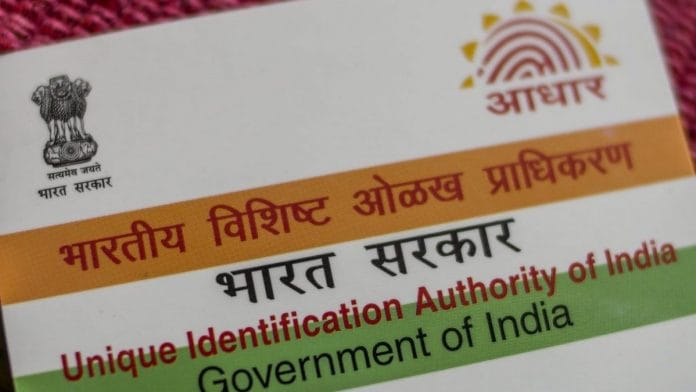New Delhi: The Unique Identification Authority of India (UIDAI) has informed the Supreme Court that it will issue Aadhaar cards to sex workers on the basis of a certificate to be given by the National AIDS Control Organisation (NACO), and without insisting on proof of residence from them.
The UIDAI is a statutory authority that issues Aadhaar cards after collecting mandatory details of the applicant such as name, gender, age and address, as well as optional data that could include either email or mobile number.
However, in the case of sex workers, the UIDAI has decided not to ask for residential proof and instead accept a certificate that can be issued to the sex worker by a gazetted officer of NACO, or of the state health department.
NACO is a department under the Union Ministry of Health and Family Welfare, and maintains a central database on sex workers.
On Monday, the UIDAI placed a proposed proforma of the certificate before the top court when a bench led by Justice L.N. Rao was hearing a petition on providing social security benefits to sex workers across India, including formulating a rehabilitation scheme for those who want to opt out of the flesh trade.
The top court has been monitoring the case since 2011.
The UIDAI’s affidavit came in response to the court’s 10 January order that asked the authority to explore if the information with NACO on sex workers can be treated as proof of residence and Aadhaar be given to them on the basis of the same.
Also read: ‘False evidence, tainted cops’: Why 15 HC verdicts freed 30 death row convicts last year
What was argued in SC
During the January hearing, senior advocate Jayant Bhushan and Pijush K. Roy, who are assisting the court in the matter, drew the court’s attention to the difficulties sex workers faced during the pandemic, despite the court’s direction to states on providing dry rations to them.
Bhushan and Roy asked the court to ensure that dry-rations supply to sex workers isn’t stopped with a decline in Covid-19 cases. The two also addressed the court on the difficulties faced by sex workers when it came to seeking Aadhaar enrolment. They pointed out that proof of address is required to fill up the Aadhaar form, which sex workers cannot produce.
As a solution, the two lawyers suggested, the list prepared by NACO on sex workers could be considered for issuance of Aadhaar cards.
UIDAI agrees
Accepting the advice, the UIDAI mentioned in its affidavit Monday that the certificate to be issued either by a NACO officer or a state health department officer shall work as an alternative to the formal proof of identity or proof of address document for generating Aadhaar number.
“It is submitted that if the above procedure is followed, no formal proof of residence will be required and requirement of any formal proof of residence can be dispensed with for the purpose of Aadhaar enrolment,” the agency submitted.
Meanwhile, nudged by the Supreme Court, many states and Union territories have fast-tracked the process of issuing voter identity and ration cards to sex workers.
During a hearing on 14 December 2021, the top court rued the fact that states had failed to comply with its 2011 order on issuing ration cards and voter ID cards to all sex workers.
“Right to dignity is a fundamental right that is guaranteed to every citizen of this country irrespective of his/her vocation. There is a bounden duty cast on the government to provide basic amenities to the citizens of this country,” the order said.
“The state governments/Union territories and other authorities are directed to commence the process of issuance of ration cards/voter identity cards immediately to sex workers from the list that is maintained by NACO.”
According to the latest status report submitted to the court Monday, Assam, Chhattisgarh, Jammu and Kashmir, Odisha, Uttar Pradesh and Madhya Pradesh have instructed their district collectors to ensure all sex workers get their election IDs.
Haryana has asked the state legal services authority to assist the authorities concerned to issue voter ID cards to sex workers as well as in distribution of dry rations. While Kerala, Tamil Nadu and Puducherry have also taken measures, Maharashtra and West Bengal have provided no information to the court in this regard.
(Edited by Amit Upadhyaya)
Also read: Don’t deserve to be strung along, says Bengaluru lawyer who rejected HC judgeship after impasse






